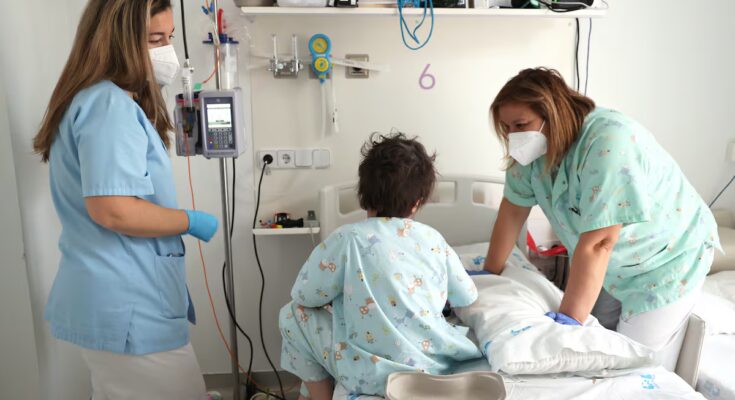In Spain, pediatric palliative care advances more slowly than the real needs of children suffering from incurable diseases, and differences between communities show an inequality that affects both the quality of life of children and the well-being of their families. Although most of these minors experience long periods with complex symptoms requiring ongoing medical, psychological and social support, there is still not enough equipment or trained specialists to care for them. In this context, the alliance between the Aladina Foundation and the Spanish Society of Pediatric Palliative Care (PEDPAL) was born last November, which aims to take a decisive step towards structural change through the advanced training of new professionals.
Only in this way, explains Dr. Ricardo Martino, director of the Integral Pediatric Palliative Care Unit (UAIPP) of the Niño Jesús Hospital, in Madrid, and trainer of the first doctor with a scholarship. Through this alliance “we will be able to reach the approximately 60,000 children who could benefit from palliative care in Spain”, a fact which underlines that “no one has really looked at this reality”. “Only those of us who are with them every day see it,” complains the doctor.
Martino insists that it is urgent to dismantle the misunderstanding that still surrounds palliative care. “People think about imminent death, but in pediatrics we don’t just talk about the end of life,” he explains. Many of these children – newborns with serious diagnoses, minors with degenerative diseases or metabolic pathologies, adolescents with refractory epilepsies… – can live for months or years. The essential thing, he adds, is to understand that palliative care “must not bring forward death or artificially delay it; it must allow the child to live in the best possible way for all the time he has left to live”. This ethical and clinical principle is what guides every decision your unit makes.
The UAIPP of Niño Jesús is the public reference in Spain and serves around 700 minors a year, with home support for more than a hundred families throughout the Community of Madrid. Martino reminds us that home care is not only more humane, but more effective: “A day in intensive care costs around 2,000 euros; at home, with full support, around 200. We are a business”, he specifies ironically, aware that this model reduces unnecessary hospitalizations and improves the emotional well-being of children.
Paco Arango, founder of the Aladina Foundation, has been accompanying minors with cancer for almost twenty years and supporting pediatric palliative units. For him the need is evident: “We need many more palliative doctors. It is not easy to dedicate ourselves to this, but it is fundamental”. Arango agrees with Martino that palliative care is not the end of life: “I’ve seen children in palliative care live much better than children with cancer,” he says. This belief is the basis of Aladina’s full financing of the ESPEDPAL program – a specific medical training program in pediatric palliative care – which has already incorporated a first doctor in Niño Jesús and hopes that in 10 years there will be a multidisciplinary team in each autonomous community that has an advanced training specialist, a pediatric psycho-oncologist and a social worker. “I think it’s doable. There’s a calling and there’s a need. We just need to solidify the model,” he says.
The challenge is greater because, although the Ministry of Health recommended in 2014 that every community have at least one multidisciplinary pediatric palliative team, the reality is still far from that ideal map, as explained in the latest report prepared on the topic in 2022. There is a lack of complete teams, there is a lack of stability in funding and there is a lack of official recognition as a training area. Faced with this void, the third sector has taken on a good part of the leadership: PEDPAL and Fundación Dignia, an organization created to promote integration and the creation of initiatives that promote palliative care, promote training, while Aladina and other entities seek patrons to ensure their continuity.
Arango reminds us that support cannot be limited to training. The foundation financed the renovation of Niño Jesús, including the palliative area, and promoted initiatives that transform the daily lives of families, such as therapy with dogs at home. “It’s amazing how a dog can change the environment. Even doctors ask about it because of the stress they experience,” he comments. They also offer grief therapy for a year to parents after the loss of a child.
The emotional impact runs through every corner of this work. Healthy siblings suffer, parents reorganize their lives and, in many cases, lose their jobs. For this reason, the Baby Jesus palliative unit accompanies not only the minor’s symptoms, but the entire network of relationships that supports the family. «We cry even before we die. Let’s restore bonds between brothers, let’s prepare families”, explains Martino. He himself recognizes that even professionals need to support themselves: «What supports you is outside of work: family, friends, hobby. “You have to empathize without getting overly involved.”
While Aladina advances in projects such as the renovation of the oncology area of Vall d’Hebron, in Barcelona, or the future Casa Aladina – a 15 million euro center for families with hospitalized children that will be built in the Madrid neighborhood of Hortaleza -, its alliance with PEDPAL marks a before and after. It is still an initial but firm step towards a country where no child will be left without the care they deserve. “Let’s join forces to do good in palliative matters,” summarizes Arango.
Every home visit that prevents hospitalization, every dog that calms a crisis, every family that feels accompanied, every child that manages to sleep without pain at home is a light that turns on at the end of that corridor. ESPEDPAL was born so that, one day, that light will reach everyone.



